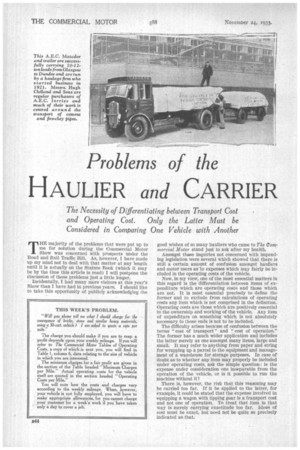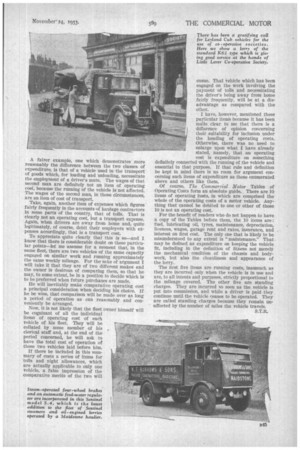Problems of the
Page 54

Page 55

If you've noticed an error in this article please click here to report it so we can fix it.
HAULIER and CARRIER
The Necessity of Differentiating between Transport Cost and Operating Cost. Only the Latter Must be Considered in Comparing One Vehicle with Another
THE majority of the problems that were put up to me for solution during the Commercial Motor Show was concerned with prospects under the Road and Rail Traffic Bill. As, however, I have made up my mind not to deal with that matter at any length until it is actually on the Statute Book (which it may be by the time this article is read) I will postpone the discussion of those problems just a little longer.
Incidentally, I had many more visitors at this year's Show than I have bad in previous years. I should like to take this opportunity of publicly acknowledging the
good wishes of so many hauliers who came to The Commercial Motor stand just to ask after my health.
Amongst the inquiries not concerned with impending legislation were several which showed that there is still a certain amount of confusion amongst hauliers and motor users as to expenses which may fairly be included in the operating costs of the vehicle.
Now, in my view, one of the most essential matters in this regard is the differentiation between items of expenditure which are operating costs and those which are not. It is most essential precisely to define the former and to exclude from calculations of operating costs any item which is not comprised in the definition. Operating costs are those which are positively essential to the ownership and working of the vehicle. Any item of expenditure on something which is not absolutely necessary to those ends is not to be included.
The difficulty arises because of confusion between the terms "cost of transport" and "cost of operation." The former has a much wider application and includes the latter merely as one amongst many items, large and small. It may refer to anything from paper and string for wrapping up a parcel to the equipment and management of a warehouse for storage purposes. In case of doubt as to whether any item may properly be included under operating costs, ask the simple question: is the expense under consideration one inseparable from the operation of the vehicle, or is it possible to run the machine without it?
There is, however, the risk that this reasoning may be carried too far. If it be applied to the latter, for example, it could be stated that the expense involved in equipping a wagon with tipping gear is a transport cost and not one of operation. To treat that item in that way is merely carrying exactitude too far. Ideas of cost must be exact, but need not be quite so precisely indicated as that.
A fairer example, one which demonstrates more reasonably the difference between the two classes of expenditure, is that of a vehicle used in the transport of goods which, for loading and unloading, necessitate the employment of a driver's mate. The wages of that second man are definitely not an item of operating cost, because the running of the vehicle is not affected. The wages of the second man, in those circumstances, are an item of cost of transport. Take, again, another item of expenses which figures fairly frequently in the accounts of haulage contractors in some parts of the country, that of tolls. That is clearly not an operating cost, but a transport expense. Again, when drivers are away from home and, quite legitimately, of course, debit their employers with expenses accordingly, that is a transport cost. To appreciate quite clearly that this is so—and I know that there is considerable doubt on these particular points—let me assume for a moment that, in the same fleet, there are two vehicles of the same capacity engaged on similar work and running approximately the same weekly mileage. For the sake of argument I will take it that they are of two different makes and the owner is desirous of comparing them, so that he may, to some extent, be in a position to decide which is to be preferred when future purchases are made.
He will inevitably make comparative operating cost a principal consideration when deciding his choice. If he be wise, that comparison will be made over as long a period of operation as can reasonably and conveniently be arranged.
Now, it is not likely that the fleet owner himself will be cognizant of all the individual items of operating cost of each vehicle of his fleet. They will be collated by some member of his clerical staff and, at the end of the period concerned, he will ask to have the total cost of operation of those two vehicles laid before him.
If there be included in this summary of costs a series of items for tolls and night allowances, which are actually applicable to only one vehicle, a false impression of the comparative merits of the two will ensue. That vehicle which has been engaged on the work involving the payment of tolls and necessitating the driver's being away from home fairly frequently, will be at a disadvantage as compared with the other.
• I have, however, mentioned these particular items because it has been made clear to me that there is a difference of opinion concerning their suitability for inclusion under the heading of operating costs. Otherwise, there was no need to enlarge upon what 1 have already stated, namely, that an operating cost is expenditure on something definitely connected with the running of the vehicle and essential to that purpose. If that rule and definition be kept in mind there is no room for argument concerning such items of expenditure as those enumerated above and others like them.
Of course, The Commercial Motor Tables of Operating Costs form an absolute guide. There are 10 items of operating tosts, in which are comprised the whole of the operating costs of a motor vehicle. Anything that cannot be debited to one or other of those 10 is not an operating cost.
For the benefit of readers who do not happen to have a copy of the Tables before them, the 10 items are: fuel, lubricating oil, tyres, maintenance, depreciation, licences, wages, garage rent and rates, insurance, and interest on first cost. The only one that is likely to be misunderstood to any extent is "maintenance." That may be defined as expenditure on keeping the vehicle fit, including in the definition of fitness not merely the mechanical condition of the chassis and bodywork, but also the cleanliness and appearance of the lorry.
The first five items are running costs, inasmuch as they are incurred only when the vehicle is in use and are, to all intents and purposes, strictly proportional to the mileage covered. The other five are standing charges. They are incurred so soon as the vehicle is put into commission, and while a driver is paid they continue until the vehicle ceases to be operated. They are called standing charges because they remain unaffected by the number of miles the vehicle travels.
S.T.R.




















































































